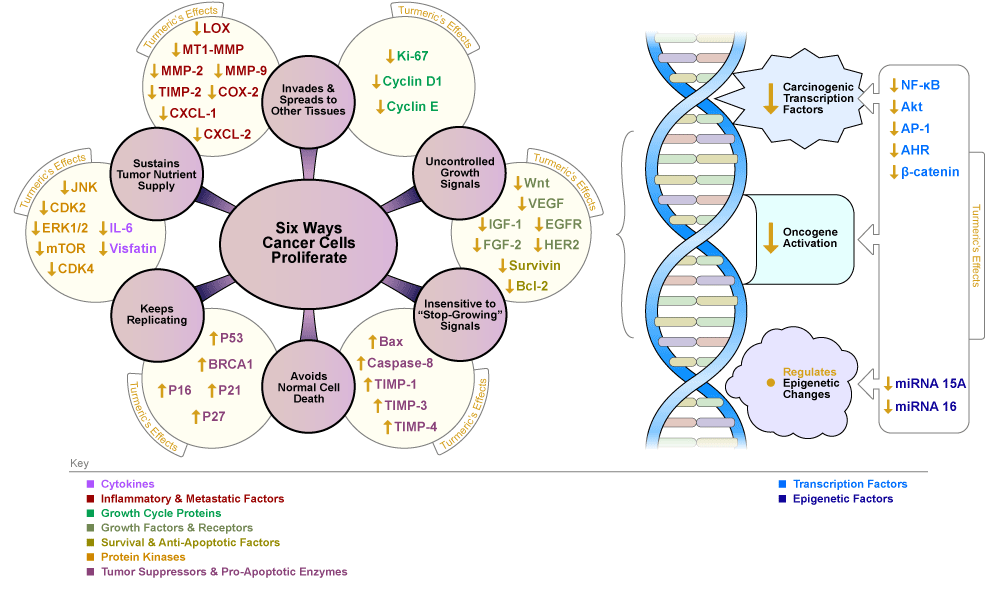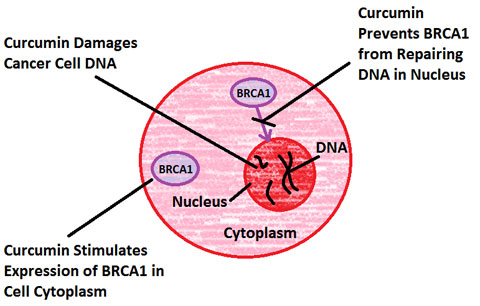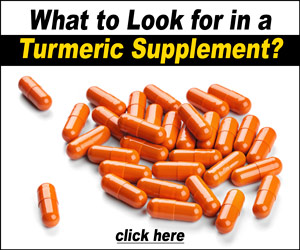Can Turmeric Help Defeat Breast Cancer?

Breast cancer is the most common type of cancer in women, and it can also occur in men. Research evidence suggests that curcumin, a pigment and primary chemical component of turmeric rhizomes, may help prevent and treat breast cancer. The turmeric compound may even help with the difficult-to-treat HER-2 positive type of breast cancer. (vi.230, 231)
Perhaps more importantly, curcumin may enhance the ability to treat patients with advanced stage breast cancer. Since there is currently no 100% effective therapy for metastatic breast cancer, turmeric's curcumin could be a safe, natural way to limit the spread of breast cancer. (vi.6, 10, 16, 230, 232, 233)
Causes and Risk Factors for Breast Cancer
Some of the factors that may increase the risk of developing breast cancer or promoting existing tumors include:
- Obesity: Studies show that obesity is linked to a higher risk of developing new or recurrent breast cancer. (vi.234)
- Low levels of adiponectin: A beneficial hormone secreted by fat cells, adiponectin helps regulate body mass. Low adiponectin levels are considered an indicator for increased risk of breast cancer. A recent review of premenopausal women with a history of breast cancer found that those with low levels of adiponectin also had a higher risk of recurrent cancer. (vi.235, 236)
- High leptin levels: Leptin is a hormone secreted by fat cells that interacts with the hypothalamus in the brain and gives the feeling of fullness after eating. Higher than normal leptin levels are associated with increased risk of obesity and greater risk of breast cancer recurrence. (vi.234, 237)
-
Diabetes and insulin resistance: Higher fasting glucose and insulin levels, often symptoms in patients with diabetes and insulin resistance, are associated with an increased risk for recurrent breast cancer. (vi.234)

- Dietary factors: Acrylamide is a potentially carcinogenic chemical produced in foods fried at high temperatures (especially food high in carbohydrates, such as potato chips and French fries). Population studies suggest there's an increased risk of breast cancer and acrylamides. Very well-done meat has also been linked to a higher risk of breast cancer. (vi.189, 220)
- Toxic chemicals: Repeated exposure to compounds such as in dioxins and those found synthetic pesticides have been linked to increased risk of breast cancer in some studies. (vi.221)
How Can Turmeric Help?
Turmeric and its compounds have antioxidant, detoxifying, and anti-inflammatory properties that may help prevent the development or progression of tumors in the breast. Specific activity against breast cancer includes: (vi.10)
- Protection against potential carcinogens. (vi.134)
- Lowering risks from metabolic syndrome diseases. (vi.213, 234-237)
- Boosting the immune system's antitumor activity. (vi.238)
- Inhibiting breast cancer stem cells. (vi.226, 239)
Turmeric compounds have been tested to assess how well they can prevent breast tumors from developing and their effects against existing breast cancer. The most well-researched turmeric compounds are the curcuminoid pigments that make turmeric spice golden yellow, which could also improve conventional treatment for breast cancer. (vi.10, 16, 65, 232)
Preventing Breast Cancer with Turmeric
Comparative studies show that rates of breast cancer are far lower in populations that consume turmeric. Modern medical research corroborates the benefits of turmeric and its curcumin compounds in reducing risk factors for breast cancer, which may explain the lower incidence of breast cancer in countries such as India. In addition, results of a vast majority of animal studies suggest that turmeric and curcumin could help prevent the development of breast tumors: (vi.10, 16, 65, 240)
- Dietary turmeric given prior to and after exposure to carcinogens significantly reduced incidence, size, and number of breast tumors.
- Injections of 100-200 mg/kg body weight of curcumin prevented breast adenocarcinomas in animal studies.
- In one study using rats, curcumin at 1% of the diet inhibited tumor formation. But in a study using mice, 2% dietary curcumin did not reduce the incidence of breast tumors — although it did decrease the number mice developing lymphoma or leukemia by over 50%.
Help Treat Breast Cancer with Turmeric's Curcumin Compounds
Lab and in animal models, turmeric's curcumin compounds and its analogues shows effectiveness in treating various breast cancer types, including the MCF-7 cells resistant to Adriamycin®. It also significantly blocked breast cancer from metastasizing to the lung in animal studies while improving conventional therapy outcomes and limiting toxicity of some chemotherapy drugs. (vi.10, 16, 65, 233)
Turmeric compounds help regulate dozens of proteins and factors affected by cancer cells. Proteins act in many different roles, including as: (vi.11, 56, 89, 134, 158, 232, 489, 490)
- Triggers that catalyze reactions and gene activity.
- Growth factors and receptors that stimulate other proteins needed for cells to replicate and divide.
- Signals that ultimately suppress a cell from moving forward in its life cycle or cause it to die.
Depending on the site and kind of cancer, tumor cells express different types and amounts of proteins. Chemotherapy drugs typically target one of these factors. Unlike some chemotherapy drugs, turmeric compounds such as curcumin target multiple factors. Curcuminoid compounds from turmeric also appear to work against different types of breast cancers. (vi.2, 89, 158)
Turmeric's curcumin compounds activate, stimulate, or limit multiple protein factors when it encounters breast cancer cells. Curcumin can even potently block pathways that help breast cancer stem cells survive. Some examples of its effects include: (vi.2, 68, 68, 81, 99, 171, 174, 232, 241-243)

Figure VI.14: Turmeric's Curcumin Compounds Stop Breast Cancer Cells
Turmeric May Benefit Both Triple-Negative and ER+ Breast Tumors
Lab studies suggest that curcumin from turmeric could also be a valuable compound against triple negative breast cancer. Highly aggressive, these cancers are hormone-neutral and do not express abnormal levels of HER2. Because of these characteristics, hormone and HER2-targeted therapies do not work. Treatment is limited to more toxic chemo drugs, and if tumors do not respond completely and recur, the prognosis is poor. (vi.242)
Curcumin was shown to arrest and kill these triple negative breast cancer (TNBC) cells. One of the ways curcumin works against TNBC cells a three prong attack: (vi.242)

Figure VI.15: Curcumin Attacks Triple-Negative Breast Cancer Cells
Curcumin stimulates the tumor suppressor BRCA1, but then keeps it in the cell's cytoplasm where it induces cancer cell death. It also inhibits TNBC's metastatic potential. (vi.242)
Curcumin shows activity against other factors that affect both triple-negative and ER-positive types of breast cancer. Researchers note that greater than 13% of cells of the triple-negative and ER-positive types of breast cancer are positive for Ki-67. In a retrospective study involving 552 breast cancer patients, those with more than 13% of cancer cells positive for Ki-67 had a less favorable prognosis in most types of breast cancer. (vi.2, 6, 89, 107, 134, 158, 244)
Ki-67 is a protein involved with cancer cell growth. Studies indicate that substances that suppress Ki-67 can stop cancer cells from growing. Animal research shows that treatment with the turmeric compound curcumin reduces levels of Ki-67, thus benefiting both types of breast cancer. (vi.6, 107, 244)
Curcumin also blocks growth of HER-2 positive and ER- breast cancer. In lab tests, curcumin works by itself and also improves the effectiveness of the HDAC inhibitor drug trichostatin. (vi.491)
Other Beneficial Compounds in Turmeric for Breast Cancer
In addition to curcumin, turmeric contains phytochemical compounds and nutrients that research suggests can have chemopreventive effects against breast cancer. These include nutrients that are essential to methylation, a crucial and complex biochemical reaction in the body. (vi.144, 245)
In very basic terms methylation transfers a carbon atom between molecules. Insufficient methylation can lead to many diseases such as cancer, heart disease, and Alzheimer's disease. Without methylation, reactive estrogen metabolites can damage cell DNA and lead to breast cancer. (vi.245, 246)
However, methylation of certain regions of DNA by DNMT1 promotes breast cancer. Fortunately, compounds in turmeric block epigenetic factors that promote methylation of DNA, and some promote methylation of estrogen metabolites. (vi.134)
| TURMERIC COMPOUND | WHAT IT DOES |
|---|---|
|
(ALA) |
|
|
|
|
|
|
Stops breast cancer cells in the G2/M phase of their cell cycle. (vi.78) |
|
|
|
|
|
|
|
|
In lab and animal studies, quercetin shows the following effects, including against the highly invasive, estrogen-insensitive MDA-MB-231 cell line: (vi.91, 131)
|
|
|
RIBOFLAVIN (vi.71, 138) |
Otherwise known as vitamin B2, riboflavin is a cofactor to the enzyme needed to methylate estrogen metabolites. This prevents them from becoming DNA-damaging quinone molecules. (vi.245, 246) |
|
Antioxidant that can neutralize free radicals before they oxidize and transform estrogen metabolites into reactive molecules. (vi.246) |
|
Join the 1000s of People Who Are Discovering the Benefits of Turmeric.

Healthceuticals® Turmeric Curcumin Complex
100% Certified
Organic ingredients
- Organic Turmeric Extract - standardized to 95% curcuminoids.
- Organic Whole Turmeric - provides full spectrum antioxidant, anti-inflammatory turmeric benefits, including turmerones and numerous vitamins, minerals, and phytonutrients
- Organic Black Pepper Extract - standardized to 95% piperine; dramatically enhances bioavailablity.
- Organic Phospholipids - markedly improve absorption.
- Organic Ginger - works synergistically with turmeric to provide more powerful benefits.
- Absolutely FREE of potentially harmful additives and fillers such as magnesium stearate.




